Selling that vintage comic book collection for a hefty profit or watching your stocks soar might feel like hitting the jackpot. But when it comes to taxes, are capital gains considered income? The short answer is: yes, generally, capital gains are considered income by the IRS. However, the story doesn't end there. Let's dive into the nuances of capital gains and how they impact your tax obligations.
Are Capital Gains Considered Income?
Understanding how capital gains are classified for tax purposes.
📈 What are Capital Gains?
Capital gains are profits earned from the sale of an asset, such as stocks, bonds, or real estate.
🔍 Types of Capital Gains
Short-term capital gains are taxed as ordinary income, while long-term capital gains enjoy lower tax rates.
💡 Are Capital Gains Considered Income?
Yes, capital gains are considered a form of income and are subject to taxes based on their classification as short-term or long-term.
💰 Tax Implications
Depending on your income level, long-term capital gains can be taxed at rates of 0%, 15%, or 20%. Short-term gains are taxed at your ordinary income tax rate.
Understanding capital gains is essential for effective tax planning.
Understanding the Basics: What Exactly are Capital Gains?
Before we delve into the tax implications, let's clarify what we mean by “capital gains.” Simply put, a capital gain occurs when you sell a capital asset for a higher price than you originally purchased it for. These assets can range from investments like stocks and bonds to tangible items like real estate, art, or even your beloved comic book collection.
Let’s illustrate with an example. Imagine you bought a share of Company XYZ for $50 and later sold it for $75. This $25 increase? That's your capital gain. Conversely, if you sell an asset for less than you purchased it for, you experience a capital loss.
Why it Matters: How Capital Gains Impact Your Taxes
Now, back to our main question: Are capital gains considered income? The IRS considers capital gains as part of your taxable income, but with a twist. Unlike your regular salary, which is taxed at your ordinary income tax rate, capital gains are subject to capital gains tax rates. These rates are often lower than ordinary income tax rates, especially for assets held for longer periods.
Here's why this distinction is crucial:
- Lower tax rates can mean significant savings. This preferential treatment of capital gains incentivizes investment and economic growth.
- Holding onto assets longer can be rewarding. The duration for which you hold an asset (known as the holding period) determines whether your gain is considered short-term or long-term, directly impacting the tax rate applied.
Short-Term vs. Long-Term Capital Gains: What's the Difference?
The IRS differentiates between short-term and long-term capital gains, each subject to different tax treatments. Understanding this distinction is crucial for effective tax planning.
Short-Term Capital Gains:
- Definition: Gains on assets held for one year or less.
- Taxation: Taxed at your ordinary income tax rate, which varies based on your income bracket.
Long-Term Capital Gains:
- Definition: Gains on assets held for more than one year.
- Taxation: Taxed at more favorable rates than short-term gains and ordinary income. These rates are currently 0%, 15%, or 20% depending on your filing status and taxable income.
Example:
Let's say you fall into the 22% tax bracket for ordinary income. You sell some stocks that you've held for only ten months, making a $2,000 profit. This gain is considered short-term and would be taxed at your ordinary income tax rate of 22%, resulting in a $440 tax liability.
Now, imagine you held those same stocks for over a year. Instead of being taxed at 22%, your $2,000 profit would be subject to the long-term capital gains tax rate, which could be 0%, 15%, or 20% depending on your income level. This could result in substantial tax savings compared to the short-term scenario.
Exceptions to the Rule: When Are Capital Gains Not Considered Income?
While generally, the IRS classifies capital gains as income, there are some key exceptions where these gains might not be taxed, or their taxation might be deferred. Recognizing these exceptions is vital for optimizing your tax strategy.
Here are a few notable instances:
- Selling Your Primary Residence: One of the most significant exceptions applies to profits from selling your primary residence. If you’ve lived in your home for at least two of the past five years, you can exclude up to $250,000 of capital gains from your taxable income (or up to $500,000 for married couples filing jointly). This exemption can be a major advantage for homeowners.
- 1031 Exchange: Real estate investors can benefit from a powerful tax-deferral strategy known as a 1031 exchange. This allows them to defer capital gains taxes on the sale of an investment property by reinvesting the proceeds into a similar property.
- Investing in Opportunity Zones: Designed to incentivize investment in economically distressed communities, Opportunity Zones allow investors to defer capital gains taxes by reinvesting profits from previous investments into designated Qualified Opportunity Funds.
- Inherited Assets: When you inherit assets, you receive a “step-up in basis.” This means your cost basis for the asset is its market value at the time of inheritance, not the original purchase price. This provision can significantly reduce or even eliminate capital gains taxes when you eventually sell the inherited asset.
Factors that Can Influence Your Capital Gains Tax
Understanding the distinction between short-term and long-term gains and recognizing potential exceptions is crucial. However, various other factors can influence your capital gains tax liability, adding further layers to the equation.
Let's break down some of these key factors:
- Your Income Level: Your income level plays a significant role in determining your capital gains tax rate, especially for long-term gains. Higher earners generally face higher capital gains tax rates.
- Your Filing Status: Your filing status (single, married filing jointly, head of household, etc.) also impacts your capital gains tax rates. Married couples filing jointly often benefit from higher thresholds for the lower capital gains tax brackets.
- Deductions and Exemptions: Various deductions and exemptions can potentially offset your capital gains, reducing your overall tax liability.
- State Taxes: Remember that in addition to federal capital gains taxes, many states also impose their own capital gains taxes. These rates vary widely by state and can significantly impact your overall tax burden.
Minimizing Your Tax Liability: Strategies for Managing Capital Gains
While the prospect of owing taxes on your hard-earned profits might seem daunting, don't despair! By proactively employing strategic planning, you can potentially minimize your capital gains tax liability and keep more of your earnings.
Here are a few effective strategies to consider:
- Hold Investments for the Long Term: One of the simplest yet most powerful strategies is to adopt a long-term investment approach. Remember those favorable long-term capital gains tax rates? By holding onto assets for more than a year, you unlock these lower rates and potentially save significantly on taxes.
- Offset Gains with Losses: Did you experience capital losses on some investments? You can use these losses to offset your capital gains, effectively reducing your taxable income. This strategy, known as tax-loss harvesting, can be a valuable tool for investors.
- Take Advantage of Tax-Advantaged Accounts: Consider utilizing tax-advantaged retirement accounts like 401(k)s or IRAs. With these accounts, you can defer paying taxes on your investment gains until retirement, allowing your money to potentially grow more significantly over time.
- Explore Opportunity Zones: If you're seeking to reinvest capital gains, consider exploring investments in designated Opportunity Zones. These investments offer the potential for tax deferral and could be an attractive option for some investors.
- Consult with a Tax Professional: Navigating the complexities of capital gains taxes can be challenging. Seeking guidance from a qualified tax professional can provide invaluable insights and help you develop a personalized tax plan that aligns with your financial goals.
Conclusion
Are capital gains considered income? The answer, as with many things related to taxes, is: it depends. While the IRS generally treats capital gains as income, the specific rules and rates can vary based on factors like the type of asset, your holding period, income level, and filing status. By understanding the nuances of capital gains taxes and exploring potential strategies for minimizing your liability, you can make more informed investment decisions and keep more of your hard-earned profits. Remember, proactive planning and seeking expert advice are key to achieving your financial goals.
ALSO READ:
- US Tax Brackets by Income: Your Complete Guide to Taxes
- Can You Deduct Real Estate Taxes: Things to Know
- Is Disability Income Taxable: All You Need to Know in 2024
- How Does “The Tax Cuts and Jobs Act” Impact Capital Gains on Real Estate
- How Does Buying a House in Cash Affect Taxes?
- What is Biden's New Tax Plan 2025: Key Proposals Explained
- The Important Tax Benefits of Real Estate Investing
- What is the Tax Rate on Rental Income?
- Passive Income Tax Rate: How Much Tax Do You Need to Pay
- What Does Assessed Value Mean on Property Taxes?




